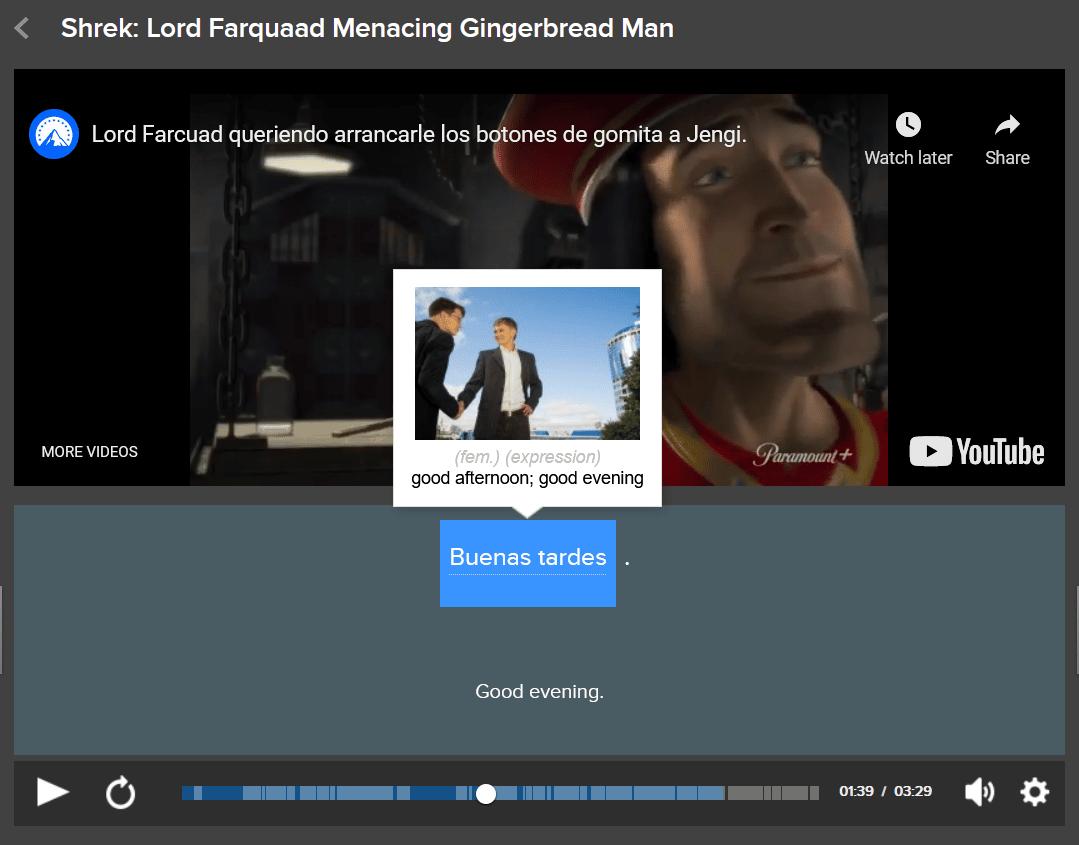Buenos Tardes Or Buenas Tardes

xviii Useful Spanish Greetings for Castilian Learners
Depending on the situation, in that location might be a specific Castilian greeting you should use beyond "Hola."
Today, we're going to go over a variety of greetings and introductions you can use. We'll also explain a little about when and how to use each ane.
Hope you lot bask this list of Spanish greetings and introductions!
Contents
- 18 Useful Spanish Greetings and Introductions
-
- 1. Hola — Howdy
- 2. Buenos días — Skillful morning time
- three. Buenas tardes — Practiced afternoon
- four. Buenas noches — Good evening
- 5. ¿Cómo está? — How are you? (Formal)
- vi. ¿Cómo estás? — How are you? (Breezy)
- seven. ¿Cómo están? — How are you? (Plural)
- 8. ¿Qué tal? — How's it going?
- 9. ¿Qué pasa? — What'south happening? / What's up?
- 10. ¿Qué hubo? — What happened?
- 11. Bienvenidos — Welcome
- 12. Mi casa es su casa — My house is your house
- 13. ¿De dónde eres? — Where are you lot from?
- 14. ¿Cómo te llamas? — What'due south your name?
- 15. ¿Aló? — Hello?
- xvi. ¿Adónde vas? — Where are you going?
- 17. ¿Dónde has estado? — Where have you been?
- xviii. ¡Hace tiempo que no te veo! — It'south been a while since I've seen you!
- Other Resources for Learning Spanish Greetings and Introductions
Download: This blog post is available as a convenient and portable PDF that you can take anywhere. Click here to get a copy. (Download)
eighteen Useful Spanish Greetings and Introductions
For some actress help learning these super-useful greetings, await for them in accurate media. For instance, you tin see them in use in native Spanish videos like movie clips and vlogs on FluentU.
Create your own deck of interactive, video flashcards with these greetings (and whatever other words you lot want to acquire) to come across other videos where they announced for context, and get tested on your memory of them through personalized flashcards.

Now say how-do-you-do to these useful greetings and introduction phrases. After all, first impressions are everything.
1. Hola — Hello
This is the almost basic of the greetings, and can exist combined with any of the other ones plant below. Now you can say, "Hola, buenos días," or "Hola, buenas tardes." The h is silent!
ii. Buenos días— Good forenoon
Literally meaning "good day," it tin too mean "good forenoon." "Buenos días" is normally used until apex.
3. Buenas tardes— Good afternoon
If y'all want to say "good afternoon," and it'southward one o'clock or afterward in the solar day, you tin say "buenas tardes."
In Spain it may be used until later in the evening, while in nearly Latin American countries and the Caribbean, information technology may exist used until the sun goes down.
four. Buenas noches — Good evening
This phrase besides ways "goodnight." Always be mindful of the context since yous could be saying adieu.
5. ¿Cómo está? — How are you? (Formal)
This is a formal manner of request how someone is feeling. It'due south unremarkably reserved for older people of those of dominance as a sign of respect. In some Due south American countries, e'er use this one to exist on the safe side.
Are you conducting business organization? Information technology is important that you inquire about a person's well-being earlier offset whatever blazon of business concern talk. Information technology'due south an indication that you care about your client.
vi. ¿Cómo estás? — How are you? (Informal)
The due south at the end indicates that you're talking to someone your same age or younger. If you hear "tutéame," y'all have permission to address the person in the informal style, regardless of age!
Get 14 Day FluentU Complimentary Trial
vii. ¿Cómo están? — How are you? (Plural)
Greeting a group of people? The n at the end volition signal that you just said hello to everyone. If you know the grouping, brand sure that yous buss everyone. Merely if you're a guy, kiss the girls and shake the men'due south hands.
Traveling to Spain? Say "¿Cómo estáis?" (ko mo es tais).
8. ¿Qué tal? — How's it going?
For some it may be informal, but in general this question can be used with anyone in a non-business setting.
9. ¿Qué pasa?— What's happening? / What'due south up?
Talking to your friends or someone younger than you? Use the phrase "¿Qué pasa?" Y'all may also hear this one when someone wants to know if something is wrong.
x. ¿Qué hubo?— What happened?
It'southward considered informal in some countries. Use information technology with your friends and family. Just retrieve the dominion about the silent h.
xi. Bienvenidos — Welcome
Want to welcome someone to your home? The Castilian phrase is pronounced "Bi en ße ni dos."
Keep the final s if you are welcoming more than 1 person. Driblet the final s and it becomes singular.
If you're speaking to a female, you'll say "bienvenida," just for a gentleman, say "bienvenido." Welcoming a group of females? Use the give-and-take "bienvenidas." It may sound chauvinistic, but utilise the form "bienvenidos" if it is a mixed group.
12. Mi casa es su casa — My house is your house
If you want to make someone comfy in your domicile, you can say, "Mi casa es su casa." You're not really giving your house abroad, but you are indicating that they tin can experience at home.
If you invited someone your same age, change the "su" to "tu."
thirteen. ¿De dónde eres? — Where are you lot from?
Use this phrase when yous desire to inquire someone your age or younger where they're from. The question will change to "¿De dónde es usted?" if you're speaking to an developed or someone of authority.
fourteen. ¿Cómo te llamas? — What's your proper noun?
Literally pregnant "What do you call yourself?" this is what you say when you want to ask someone's name. It does accept a few variations depending on formality. If you lot want to ask someone older in Castilian you say, "¿Cómo se llama?"
xv. ¿Aló?— Hello?
This is a common mode of answering the phone in many Spanish-speaking countries. Depending on where you travel, you lot may hear "bueno," "sí," and "diga" instead to answer a telephone phone call.
Regardless of the greeting, respond by saying who you are and make certain to inquire how they are. It's impolite non to ask! Thank them very much. Then, state the purpose of your call.
16. ¿Adónde vas? — Where are you going?
Maxim howdy to someone who's in a rush? To ask someone where they're going in Spanish, say this phrase. Change information technology to "va" for formal conversations and if you're asking a group of people where they're going in Kingdom of spain, change it to "vais."
17. ¿Dónde has estado? — Where have you been?
Has it been a long time since you lot've seen someone? Say "hola" and detect out where they take been. Be prepared to go the whole story!
xviii. ¡Hace tiempo que no te veo! — Information technology's been a while since I've seen you!
You're maxim hi, but it's been ages since you've seen them.
Other Resources for Learning Castilian Greetings and Introductions
Need more than Castilian greetings and responses? The post-obit websites have a few more than vocabulary words:
- Want to learn about greetings in letters and kissing etiquette? This site volition give yous a few more words and explanations.
- Need to know how Castilian greetings sound? You can find sound files and more vocabulary yous can utilise anywhere.
Now go out and say hello. Possibly you'll make some Spanish-speaking friends!
Download: This blog mail service is available as a convenient and portable PDF that you lot can have anywhere. Click here to go a copy. (Download)
Buenos Tardes Or Buenas Tardes,
Source: https://www.fluentu.com/blog/spanish/learn-spanish-greetings-introductions-list/
Posted by: matosloce1998.blogspot.com


0 Response to "Buenos Tardes Or Buenas Tardes"
Post a Comment